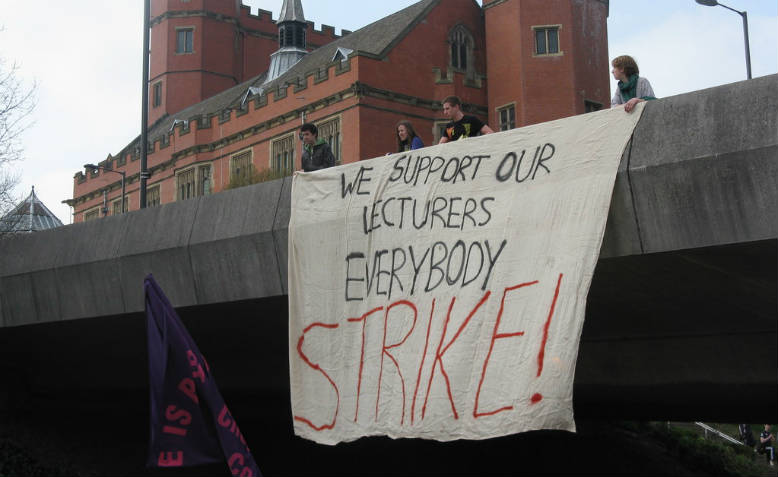 UCU strike at University of Sheffield, February 2018. Photo: Geograph/Dave Pickersgill
UCU strike at University of Sheffield, February 2018. Photo: Geograph/Dave Pickersgill
Now is the time to fight against the marketisation of universities, argues Des Freedman
Staff in over 50 universities are set to take strike action over a range of issues including pay, precarity, equalities and pensions following the results of two ballots by members of the UCU.
The ballot results weren’t quite at the levels of postal workers in the CWU with its 76% turnout and an amazing 97% vote for strike action to protect their conditions. Nevertheless, nearly 80% of UCU members who voted backed strike action over pensions and nearly three quarters of members voted for strikes over pay. These results reveal the rising levels of anger and frustration at what is happening to working (and learning) conditions in higher education.
Faced with yet more pay stagnation and with inaction on the part of employers to deal with significant gender and race pay gaps together with the scandal of casualisation at the heart of the sector, 54 universities (and all the results are not yet out) voted to walk out. It’s not quite national action given that dozens of branches failed to meet the 50% participation threshold introduced by the Tories to weaken unions. But still, the strikes will affect over one million students across the country.
Fewer institutions were balloted over the defence of the USS pensions but this produced a higher participation rate and a higher vote for action. This is a reaction both to the tremendous 14 days of strike action that UCU members took in spring 2018 and to the employers’ ongoing refusal to guarantee the future of the scheme without making higher contributions.
Securing a mandate for action in both ballots was the result of high levels of organisation in “get the vote out” campaigns that ran throughout October. The networks of activists, both experienced and new, were the key to delivering successful votes. They are now the key to preparing for the action that is likely to come over the next months through the creation of strike committees and campus solidarity groups.
We are now waiting for UCU’s Higher Education Committee to decide on the dates and forms of action. The UCU has a new general secretary, Jo Grady, who played an important role in the 2018 pensions strikes and there is a real opportunity for the union to re-establish itself as a vigorous defender of pay and conditions as well as a champion of social justice across our institutions.
As always, this will depend on how we organise campus by campus: by the numbers on our pickets, by the strength of our strike committees and by our ability to win solidarity from students. It will depend on how we argue our case with colleagues who are not yet convinced by the need for action, with students who are themselves suffering from high levels of debt and insecurity, and with employers who need to be reminded that staff are more than just a “cost” to be minimised in tough economic times.
These arguments will be crucial if we’re to overcome the inconsistencies laid bare in the ballot results. The votes were weaker in the post-1992 universities (balloted only over pay) and of course it’s vital that stronger branches provide a lead to others who should prepare to re-ballot in order to secure the mandate to join in the action.
Higher education is going to be a big issue in the general election thanks to Labour’s promise in 2017 to deliver free education and to challenge the corporate governance of public institutions. Now that this election campaign is going to be punctuated by a wave of strikes, this is a perfect opportunity to make our case for a university system that doesn’t run on resignation, casualisation, discrimination and stagnant pay.

